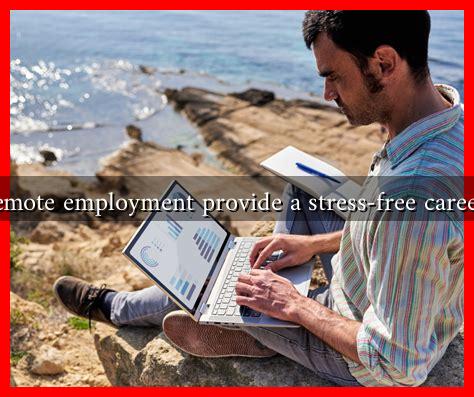-
Table of Contents
Does Remote Employment Provide a Stress-Free Career Path?
In recent years, remote employment has gained significant traction, especially in the wake of the COVID-19 pandemic. Many employees have found themselves working from home, leading to a reevaluation of what constitutes a stress-free career path. But does remote work truly offer a less stressful environment? This article explores the benefits and challenges of remote employment, providing insights into whether it can be considered a stress-free career option.
The Allure of Remote Work
Remote work offers several appealing advantages that can contribute to a less stressful work experience. Here are some key benefits:
- Flexibility: Remote work often allows employees to set their own schedules, enabling them to work during their most productive hours.
- Elimination of Commute: Working from home eliminates the daily commute, which can be a significant source of stress for many individuals.
- Work-Life Balance: Remote employment can facilitate a better balance between personal and professional responsibilities, allowing for more time with family and personal interests.
- Cost Savings: Employees save money on commuting, work attire, and meals, which can reduce financial stress.
Statistics Supporting Remote Work Benefits
Research supports the notion that remote work can lead to lower stress levels. According to a study by Buffer, 32% of remote workers cite flexibility as the primary benefit of working remotely. Additionally, a survey conducted by Owl Labs found that remote workers are 22% happier than their in-office counterparts. These statistics highlight the positive impact of remote work on employee satisfaction and stress levels.
Challenges of Remote Employment
While remote work has its advantages, it is not without challenges that can contribute to stress. Some of these challenges include:
- Isolation: Remote workers may experience feelings of loneliness and isolation, which can negatively impact mental health.
- Blurred Boundaries: The line between work and personal life can become blurred, leading to overwork and burnout.
- Communication Issues: Remote work can hinder effective communication and collaboration, leading to misunderstandings and frustration.
- Distractions at Home: Working from home can introduce distractions that may reduce productivity and increase stress.
Case Studies: Remote Work in Action
Several companies have successfully implemented remote work policies, showcasing both the benefits and challenges. For instance, GitLab, a fully remote company, emphasizes a strong culture of communication and collaboration. They utilize tools like Slack and Zoom to maintain connectivity among team members, which helps mitigate feelings of isolation.
On the other hand, a case study of a traditional company transitioning to remote work revealed challenges in maintaining team cohesion. Employees reported feeling disconnected from their colleagues, leading to increased stress levels. This highlights the importance of intentional communication strategies in remote work settings.
Strategies for a Stress-Free Remote Work Experience
To maximize the benefits of remote work while minimizing stress, consider the following strategies:
- Establish a Routine: Create a daily schedule that includes breaks to maintain productivity and prevent burnout.
- Set Boundaries: Clearly define work hours and personal time to avoid overworking.
- Stay Connected: Regularly check in with colleagues through video calls or virtual team-building activities to combat isolation.
- Designate a Workspace: Create a dedicated workspace to help separate work from personal life.
Conclusion
Remote employment offers a unique career path that can be both rewarding and challenging. While it provides flexibility, cost savings, and the elimination of commuting stress, it also presents issues such as isolation and blurred work-life boundaries. Ultimately, whether remote work is a stress-free career path depends on individual circumstances and the strategies employed to navigate its challenges. By understanding both the benefits and drawbacks, employees can make informed decisions about their career paths in the evolving landscape of remote work.
For more insights on remote work and its impact on employee well-being, you can visit Forbes.


